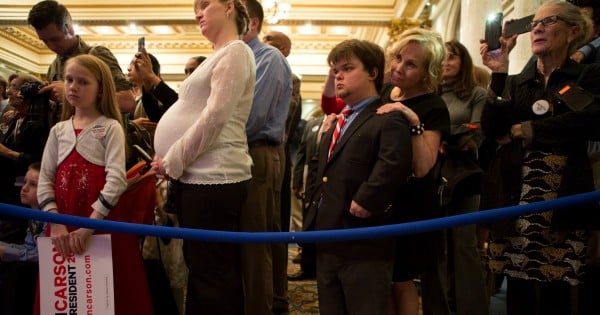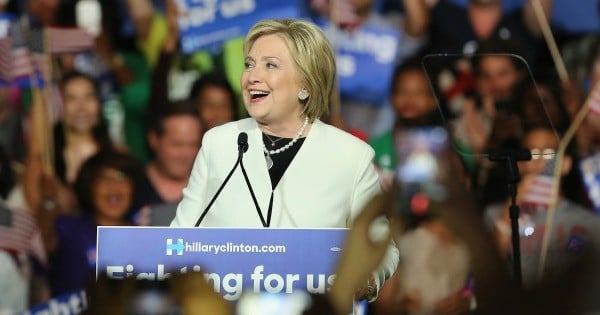
If you’ve been following the circus that is the US presidential nominations (or even if you tried to block your ears to them about the time Donald Trump called Mexicans “killers and rapists”) you’ve probably seen a bunch of headlines shouting about Super Tuesday today.
Super Tuesday is a massive step in the race for the presidential nomination in the US — and because of its implications for global politics, it’s being closely followed in Australia too.
As Americans take to the polls, we answer your burning questions about what Super Tuesday involves, and why you should care.
Back up. What even is Super Tuesday?
It’s a day that forms an important part of the nominating process of United States presidential elections.
Normally, primary votes are staggered from about late January until mid-June. But on Super Tuesday, Americans cast primary votes in about a dozen states at once. Because so many votes take place at once, this single day has the power to end or massively boost a candidacy.



Top Comments
This whole thing is strange, because if you look at the American website comments about 85% of people are huge Bernie fans, very difficult to find anyone praising Clinton, and I can't find too many Republican voters in general. this is just me random googling trying to get informed about the election/preselection. I'm not looking for left or right wing sites mainly because unlike Australia I'm not too sure what sites there are right or left, so this is pretty much random searching I have been doing. Interestingly some of the articles are praising Clinton (e.g. women writers saying women should vote for women. I'm a feminist but I don't see the logic in voting for a woman merely because I'm a woman, surely people should vote for the best candidate.) but the comments are overwhelmingly Sanders.
I like Sanders myself, what I know of him so far, so this may be my invisible bias, perhaps I am unconsciously filtering out other positive comments about the other candidates. In the beginning I was borderline Hillary but so much that I am reading about her, she seems very establishment, and flip flops on things, is putting me off. I don't think she will do anything really terrible, I just don't think she will do much, as opposed to Sanders who has a radical agenda. On the other hand i doubt he will get all of it passed, but if he gets even one or two things passed will be a huge achievement. He has plans for universal health care, raising minimum wage etc (Hillary also plans to raise minimum wage but much less than Sanders).
Interesting that whilst she has won a lot of the Super Tuesday seats some people have pointed out that quite a few of these are Republican seats so that she would probably lose them in a general election, whereas Bernie has more chance in the other upcoming states. Also she demolished him in South Carolina, where a huge amount of black people voted for her, but as someone said, if Clinton was out of the race, how many of those people would vote Republican? The black people would mostly vote Sanders if he ended up being candidate. However it does seem Bernie still has a steep hill to climb. But really hard for me to know as an outsider to all this, but I have been reading a fair bit about it lately, I just know enough to be dangerous!
I really don't think Trump will win the presidency, regardless of what democrat he is up against. He is the sort of crazy that extreme right wing people like, but I think other rightwing but not crazy right wingers will be appalled by him. But hey what would I know! All I can say is that if that guy wins we will end up in WW3! He will drag the rest of his allies into it, very scary if he wins.
The primary results so far and national polling indicates that:
- Trump is hugely popular among Republican voters, but not among the conservative establishment.
- Sanders is hugely popular among young voters, but they traditionally have low voting turnouts.
- Hilary has a few battles to face, but all polls show that she has the most support in a general election, and at this stage would beat Trump comfortably. November 8 is a long time away though.
The democrat race is easy, Clinton will crush. The only issue would be the FBI recommending charges to the DoJ over her use of a private email server for government business whilst Secretary of State. Hard to win an election when you keep having to appear in court.
Today with Cruz winning Alaska, Texas and Oklahoma and Rubio Minesota is ironically better for Trump than if he made a clean sweep. As long as the other four don't drop out, they splinter the vote which leaves Trump the leader in most states. If Cruz had lost his home state of Texas, would have been over. Rubio has to win Florida in a couple of weeks, but all polls show a big lead there for Trump. Rubio is the establishment candidate, meaning the party bosses and the money backs him. Cruz and Trump aren't. If Rubio goes down in Florida he can't win from there. So it becomes Cruz vs Trump. Even then with Rubio endorsing Cruz, it may not be enough to stop Trump. Either way, the party loses control of the nomination.